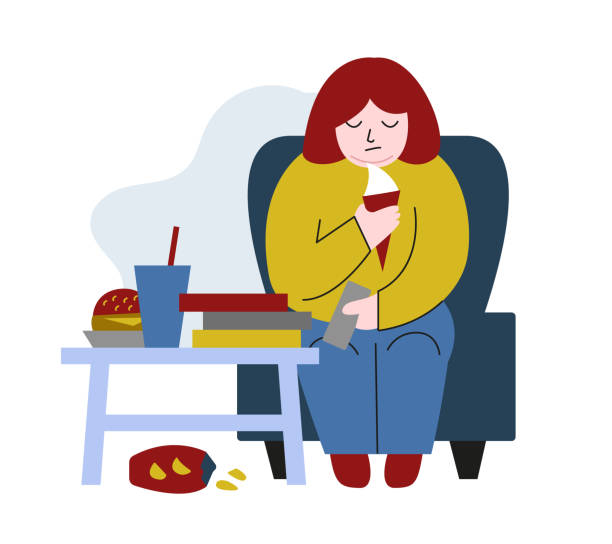Do you often find yourself eating even though you’re not hungry? Do you feel like you can’t stop eating once you’ve started? If so, then you may be dealing with compulsive eating. Compulsive eating is a type of disordered eating that affects millions of people each year. Unfortunately, it is often misunderstood and left untreated. In this blog post, we will discuss the truth about compulsive eating and why it’s so hard to overcome. We will also provide tips for overcoming this disorder and achieving healthy and sustainable weight loss.
Contents
Understanding Compulsive Eating

Compulsive eating is characterized by an uncontrollable urge to eat even when you’re not hungry. This can lead to overeating and weight gain. It can also cause other health problems, such as high blood pressure, diabetes, and heart disease.
Compulsive eating is a serious problem that can have major consequences on your health and well-being. It’s important to understand what compulsive eating is and why it happens so you can better manage the condition.
There are many reasons why people may develop compulsive eating disorders. For some, it may be due to an underlying medical condition, such as a hormonal imbalance or psychological disorder. For others, it may be a coping mechanism for dealing with stress, anxiety, or depression.
What Are The Causes Of Compulsive Eating?

There are many possible causes of compulsive eating, and it often varies from person to person. It includes:
Emotional response
Often people turn to food as a way to cope with stress or negative emotions. This can be a form of self-medication, and it can become a vicious cycle as the person feels guilty after overeating and then turns to food again as a way to comfort themselves. For example, someone might overeat after a fight with their partner or because they’re feeling down about a work situation.
Biological factors
There is some evidence that compulsive eating may be related to imbalances in certain brain chemicals, such as serotonin. Serotonin is a neurotransmitter that plays a role in mood and appetite. There is some evidence that compulsive eating may be caused by a chemical imbalance in the brain. This can be due to a genetic predisposition or as a result of other conditions such as depression or anxiety.
Environmental factors
If a person grew up in a home where food was used as a form of reward or punishment, they may be more likely to develop compulsive eating habits. Additionally, our culture’s obsession with thinness and the pressure to be perfect can also contribute to an unhealthy relationship with food.
Compulsive eating is a complex disorder, and it is often difficult to pinpoint the exact cause. However, understanding the possible causes can help seek treatment. If you are struggling with compulsive eating, please seek professional help.
Symptoms Of Compulsive Eating
There are a few key symptoms of compulsive eating that you should be aware of.
- First, if you find yourself eating even when you’re not hungry – or eating to the point of discomfort – this is a red flag.
- Secondly, if you feel like you can’t control your eating habits, or if thoughts about food dominate your day, this is also a sign that something isn’t right.
- Lastly, if you’re using food to cope with negative emotions like stress or anxiety, this is a huge indicator that your relationship with food isn’t healthy.
Other signs and symptoms may include:
- Eating much more rapidly than normal
- Eating until you’re uncomfortably full
- Frequently eating alone or in secret
- Feeling disgusted, depressed, or guilty after eating
- Experiencing strong cravings for certain foods
If you think you might be struggling with compulsive eating, please don’t hesitate to reach out for help. This is a difficult issue to face alone, and there is no shame in seeking it out.
How Can You Manage Compulsive Eating?

There are a few ways that you can manage compulsive eating. They are as follows:
- Identify your trigger: What is it that causes you to overeat? Is it a certain situation, such as being around certain people, or is it an emotional trigger, such as boredom or stress? Once you know what your triggers are, you can try to avoid them.
- Distract yourself: When you feel the urge to overeat, try to distract yourself with something else. This can be anything from reading a book to going for a walk.
- Don’t go for a restrictive diet: Restrictive diets can make compulsive eating worse. This is because when you deny yourself food, it can make you crave it more. Instead of going on a diet, focus on eating healthy and balanced meals.
- Talk to someone: If you’re struggling to manage your compulsive eating, it may help to talk to someone about it. This could be a friend, family member, or therapist.
Seek professional help: If you’re finding it difficult to manage your compulsive eating on your own, you may need to seek professional help. This could be in the form of therapy or medication.
Compulsive eating is a serious issue that can hurt your health and well-being. However, there are ways that you can manage it. If you’re struggling to cope, don’t hesitate to seek professional help.
Cognitive Behavioral Therapy (CBT)
It is one type of professional help that can be effective in treating compulsive eating. CBT focuses on changing the way you think about food and your relationship with it. For example, if you have the thought that you need to eat to feel better, CBT would help you to challenge that thought and instead think of other ways to cope with your emotions.
Dialectical Behavior Therapy (DBT)
Another type of professional help that can be effective in treating compulsive eating is Dialectical Behavior Therapy. It is a therapeutic approach that incorporates techniques from both cognitive behavioral therapy and mindfulness-based practices.
DBT emphasizes the importance of developing healthy coping skills in order to manage difficult emotions and situations, as well as promoting self-acceptance and tolerance of distress. By learning these important skills, people struggling with compulsive eating can better regulate their emotions and take control of their eating habits.
Psychotherapy
Another type of professional help is psychotherapy. This is a form of therapy that focuses on your emotions and relationships. It can help treat compulsive eating as it can help you to understand the root cause of your problem. For example, if you have a history of trauma or abuse, therapy can help you to deal with those issues. If you have a difficult relationship with food, therapy can help you to develop a healthier relationship with food.
Nutritional Therapy
Another type of professional help is nutritional therapy. This focuses on changing the way you eat and providing your body with the nutrients it needs. If you’re interested in learning more about nutritional therapy, speak to a dietitian or nutritionist. Your dietician or nutritionist can help you create a plan that’s right for you. The Diet plan includes:
- eating more whole foods
- avoid processed foods
- getting the right balance of nutrients
If you’re interested in learning more about nutritional therapy, speak to a dietitian or nutritionist. They can help you create a plan that’s right for you.
Medication
Certain medications can be used to treat compulsive eating. This is usually only recommended if other treatments haven’t been successful. These include antidepressants and anti-anxiety medications. If you’re interested in learning more about medication, speak to a doctor or psychiatrist.
Compulsive eating is a serious issue, but there are ways to manage it. If you’re struggling to cope, seek professional help from a therapist, doctor, or dietitian. They can help you develop a plan to get your eating under control.
Compulsive eating is a serious issue, but there are ways to manage it. If you’re struggling to cope, seek professional help from a therapist, doctor, or dietitian.
Conclusion
It may be concluded that compulsive eating is a serious problem that can have many negative consequences. If you think you may be a compulsive eater, it is important to seek professional help. Compulsive eating can be treated successfully with therapy and/or medication. With treatment, most people can control their urge to eat compulsively and improve their overall health and quality of life.
For further information and suggestions, please contact Therapy Mantra. We have a team of expert therapists and psychiatrists that can help you overcome this problem. Get in touch with us right away to learn more about our services. You may also make an online therapy session or download our free Android or iOS app.


